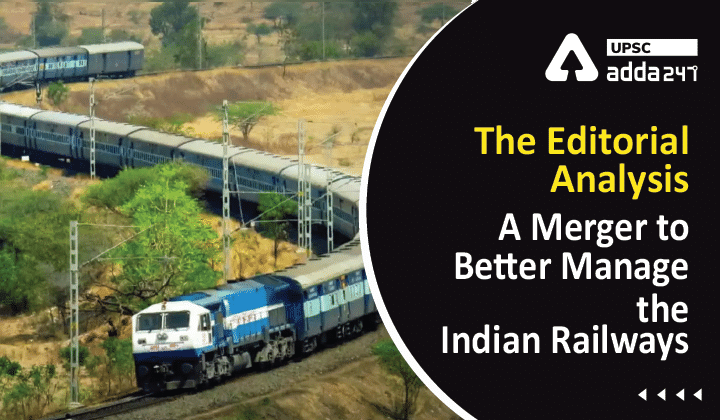Table of Contents
A Merger to Better Manage the Indian Railways- Relevance for UPSC Exam
- GS Paper 2: Governance, Administration and Challenges- Government policies and interventions for development in various sectors and issues arising out of their design and implementation.

A Merger to Better Manage the Indian Railways
- A recent Gazette notification regarding the creation of the Indian Railway Management Service (IRMS) marks a paradigm shift in the management of one of the world’s largest rail networks.
Indian Railway Management Service (IRMS)
- Creating Indian Railway Management Service (IRMS): Eight out of 10 Group-A Indian Railway services have been merged to create the IRMS.
- Eight Merged Services into IRMS:
- Indian Railway Traffic Service (IRTS),
- Indian Railway Personnel Service (IRPS),
- Indian Railway Accounts Service (IRAS),
- Indian Railway Service of Electrical Engineers (IRSEE),
- Indian Railway Service of Signal Engineers (IRSS),
- Indian Railway Service of Mechanical Engineers (IRSME),
- Indian Railway Service of Civil Engineers (IRSE) and
- Indian Railway Stores Service (IRSS).
- Application and Conducting IRMS Exams: About four lakh applicants will apply for the IRMS through the Union Public Service Commission (UPSC).
- UPSC is entrusted with conducting the recruitment exam for IRMS.
- Key Advantages of IRMS
- Removing Silos: A nearly 8,000 strong cadre of the erstwhile eight services is now merged into one-(IRMS).
- Rationalizing Railways Bureaucracy: this restructuring also aims at rationalizing the top-heavy bureaucracy of the Indian Railways.
KAVACH System of Indian Railways
A Merger to Better Manage the Indian Railways- Way Forward
- Training Existing Railway Officers: Even after the creation of IRMS, around 8000 existing railway officers will be serving in the organization for decades to come.
- This highlights the importance of training of the existing cadre of officers as they will have to deliver on the ambitious Gati-Shakti projects.
- Importance of Training: The Indian Railways will play a very crucial role in fulfilling India’s aspiration of becoming a $5 trillion economy.
- Prestigious railway projects such as a network of dedicated freight corridors, high-speed rail corridors, station re-development projects, the induction of Vande Bharat trains, etc. will play a significant role in this.
- All this will require a massive revamp of the capacity-building ecosystem of the Indian Railways.
- Revamping Training Modules for Newly Recruited IRMS Officers: The merger of services provides an opportunity to redesign the training for newly recruited IRMS officers to make them future-ready.
- Initial training along with mid-career training programmes may be reoriented.
- The focus should be to create capacity to manage the verticals of operations and business development, infrastructure development and maintenance, traction and rolling stock, and finance and human resource management.
- The IRMS training needs to be a designed based on competencies required for different leadership roles.
- Mission Karmayogi of the Government of India provides for competencies-based postings of officers.
- The Integrated Government Online Training (iGOT) program of the Government of India will be instrumental in shaping the career progression of IRMS officers.
Conclusion
- Young graduates who will be opting for the IRMS through the civil services examination should be aspirational and agile learners.
- They have the opportunity not only to serve the country’s lifeline but also to turbocharge the engine of the economy.
Bullet Trains: Does India Need Them?




 TSPSC Group 1 Question Paper 2024, Downl...
TSPSC Group 1 Question Paper 2024, Downl...
 TSPSC Group 1 Answer key 2024 Out, Downl...
TSPSC Group 1 Answer key 2024 Out, Downl...
 UPSC Prelims 2024 Question Paper, Downlo...
UPSC Prelims 2024 Question Paper, Downlo...
